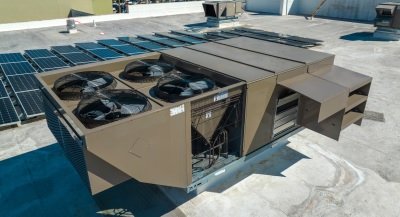The Best Commercial Air Conditioning Solutions Gold Coast
A new air conditioning system is often more energy efficient and can decrease energy use, making it a very cost-efficient option. Whether you need air conditioning for a new Gold Coast building or an existing building, Bay Air can design, install and service air conditioning systems to improve your business.
Why Install a Commercial Air Conditioning System
Ensuring proper ventilation for your business is paramount. It is an important investment to create and maintain a healthy indoor environment. Effective ventilation helps reduce the buildup of volatile organic compounds and serves to alleviate allergies and associated health issues.
Air conditioning stands out as a crucial consideration for Australian business owners. It involves a system designed to control the ventilation and temperature within a building, ensuring a comfortable environment for its occupants.
Things to Consider When Investing in a Commercial Air Conditioning System for your Gold Coast Business.
What is Commercial Air Conditioning?
A commercial air conditioner is a system that can be used in large office buildings or public venues and also ideal in small shops and cafes.
To cater to the diverse needs of commercial air conditioning, you must select a system with varying cooling and heating capacities. Understanding the primary types of commercial air conditioners is crucial for choosing the right one for your business and commercial properties.
DIFFERING LOCATIONS
The size of commercial heating and cooling systems often necessitates their placement
Generally we install these on the roofs of commercial buildings. While residential units are typically situated near or behind homes, such an arrangement proves impractical for commercial structures.
Mounting HVAC systems on rooftops not only maximizes unused space but also safeguards them from potential vandalism. Moreover, a rooftop location facilitates easy HVAC maintenance without disrupting daily business operations.
FRESH AIR INTAKE
Due to the absence of opening windows in commercial buildings, it becomes imperative to introduce fresh air into the premises.
The addition of fresh air to a heating or cooling system serves two primary purposes: it regulates Indoor Air Quality (IAQ) by controlling building pressures and enhances IAQ by diluting stagnant or polluted indoor air.
External air enters the system via roof or sidewall vents, collecting air from a clean outdoor source. This air is drawn through a filter and directed into a duct connected to the return plenum (air intake). Smaller systems utilize the negative pressure generated by the air handler fan to draw in outside air, which then blends with the return air before being evenly distributed throughout the building via the supply duct system.
This process pressurizes the building, expelling a portion of the indoor air in each air change, thereby diluting existing air and expelling indoor pollutants. In cases where combustion appliances are present, and combustion air is sourced externally, outside air also serves as combustion air for these appliances.
Why Are Commercial Air Conditioning Systems More Powerful?
Commercial spaces are typically much larger than residential ones and serve a higher volume of people. Commercial HVAC units must be meticulously sized to account for peak hours when both employees and customers are present. Achieving proper sizing demands the expertise of contractors with specialised technical skills and experience.
Residential units are generally smaller in terms of heating and cooling capacity. Nevertheless, accurate sizing for residential systems is equally critical. In fact, it may be even more vital because an undersized unit will struggle to maintain the desired comfort level, while an oversized unit will cycle on and off too frequently, failing to adequately remove humidity, which can result in premature system wear.
Choose Bay Air - an Industry Leader with More Than 25 Years of Experience
Bay Air Air Conditioning design and install all types of commercial air conditioning and refrigeration systems for Businesses throughout the gold coast region
Residential vs. Commercial Air Conditioning
For effective air conditioning in your Gold Coast business, investing in top-notch systems is essential. Air conditioning not only dehumidifies your small business space but also cools it down. To make the right choice, it's crucial to differentiate between residential and commercial air conditioning systems. Key factors to consider include:
Size of the Air Conditioner
The size of heating and cooling systems employed in commercial settings is greater than those utilized in residential homes. Furthermore, these systems vary in terms of the components they incorporate. For example, thermostats, compressors, blowers, dampers, and condenser fans in each system differ in size.
The Power of the Air Con System
The selection of an air conditioning system depends on the dimensions of your property. For a commercial structure, a larger and more robust system is necessary to effectively address its heating and cooling requirements.
Similarly, the residential air conditioner you opt for should possess sufficient power to adequately cater to the comfort needs of the occupants within the home.
Location of the Air Con Unit
Residential air conditioners are typically situated either outside the residence or at ground level. On the other hand, commercial air conditioners can also be positioned outdoors, but they are often installed on the roof.
The spacious roof area in commercial buildings accommodates the placement of these large air conditioning units. Additionally, servicing commercial air conditioners from the roof can be accomplished with minimal disruption to business operations.
Complexity of the System
Commercial air conditioning systems are designed to be more intricate in order to meet the heating and cooling demands of expansive business facilities. In contrast, residential systems are intended for spaces occupied by a smaller number of individuals with relatively consistent climate control needs.
In summary, maintaining proper ventilation and selecting the right air conditioning system are vital considerations for both residential and commercial properties, each with its unique requirements and challenges.





